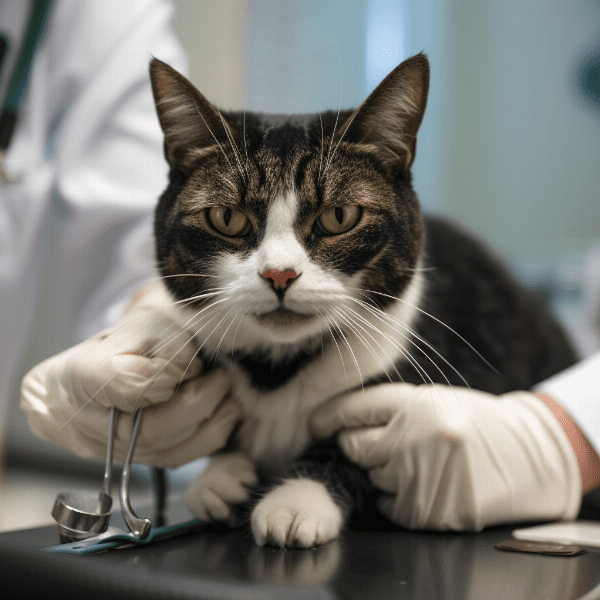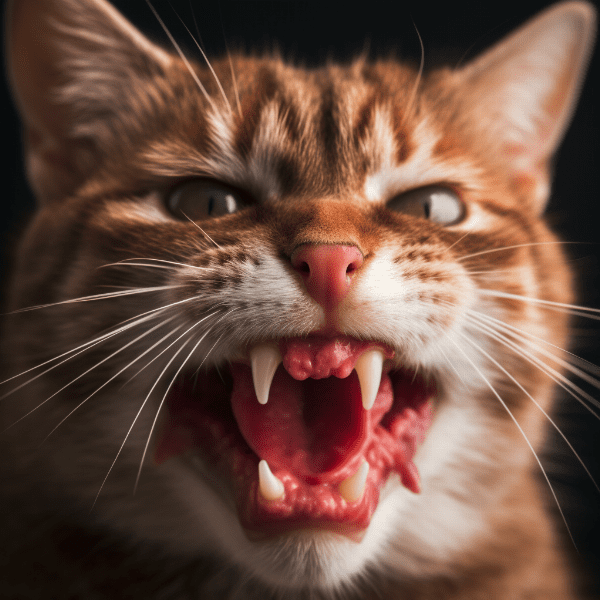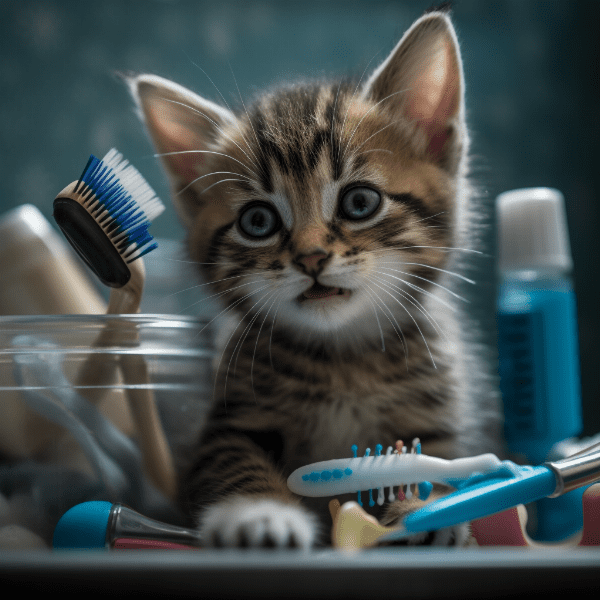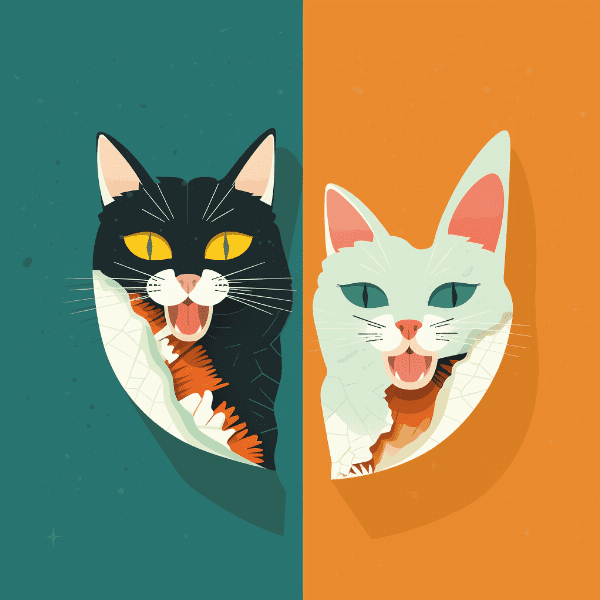Table of Contents
- Understanding Rotten Cat Teeth
- Symptoms of Rotten Cat Teeth
- Causes of Rotten Cat Teeth
- Prevention of Rotten Cat Teeth
- Diagnosis of Rotten Cat Teeth
- Treatment Options for Rotten Cat Teeth
- Home Remedies for Rotten Cat Teeth
- Dental Care for Cats
- Diet and Nutrition for Healthy Teeth in Cats
- Regular Vet Check-Ups for Dental Health
Understanding Rotten Cat Teeth
Rotten cat teeth, also known as dental caries, are a common dental problem that affects cats of all ages. It is a condition that occurs when the hard, outer layer of the tooth (the enamel) is eroded due to bacterial infections, which then causes holes or cavities to form in the tooth.
How Do Rotten Cat Teeth Develop?
Rotten cat teeth develop when the cat’s diet consists mostly of carbohydrates or sugary food, which bacteria in the mouth feed on and produce acid that erodes the enamel. The acid produced by the bacteria can also irritate the gums, causing them to become inflamed and bleed. If left untreated, the bacterial infection can spread to the root of the tooth, causing abscesses, pain, and discomfort.
What Are the Signs of Rotten Cat Teeth?
Cats are known to be stoic creatures, but some common signs of rotten cat teeth include bad breath, yellowing of the teeth, difficulty chewing, drooling, and pawing at the mouth. In severe cases, cats may stop eating altogether, leading to weight loss and malnutrition.
Why Is It Important to Treat Rotten Cat Teeth?
Rotten cat teeth can cause severe pain and discomfort, leading to behavioral changes, irritability, and a decrease in the quality of life of your feline companion. Additionally, if left untreated, the bacterial infection can spread to other parts of the body, leading to serious health problems.
It is essential to treat rotten cat teeth as soon as possible to prevent further complications and ensure your cat’s overall health and wellbeing. In the next section, we will discuss the causes of rotten cat teeth, so you can take proactive steps to prevent this condition from occurring in your feline friend.
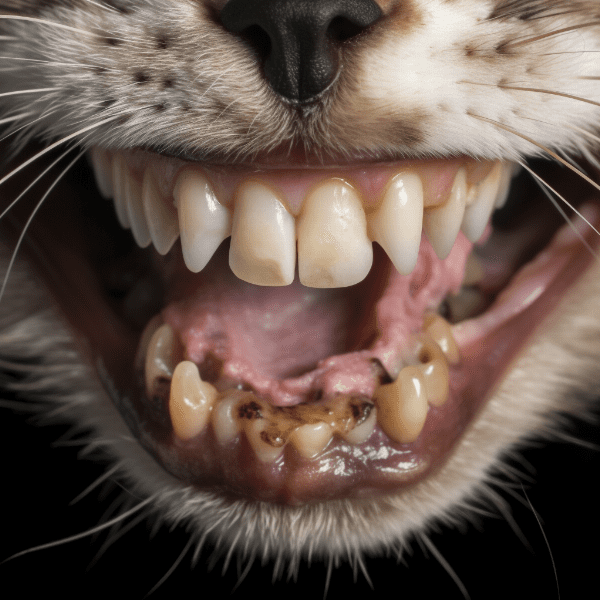
Symptoms of Rotten Cat Teeth
Recognizing the symptoms of rotten cat teeth is crucial to preventing further complications and ensuring your cat’s dental health. In this section, we will discuss the common symptoms of rotten cat teeth, so you can take the necessary steps to seek treatment for your feline companion.
Bad Breath
One of the most common symptoms of rotten cat teeth is bad breath. If you notice that your cat’s breath has a foul odor, it may be a sign that bacteria are growing in their mouth, leading to dental decay.
Yellowing of the Teeth
Another common symptom of rotten cat teeth is yellowing of the teeth. As the enamel erodes, the teeth may start to appear discolored or stained.
Difficulty Chewing
If your cat is experiencing dental pain, they may have difficulty chewing or may even refuse to eat altogether. This can lead to weight loss and malnutrition, which can have serious health consequences.
Pawing at the Mouth
If your cat is experiencing dental pain, they may paw at their mouth or rub their face against objects to alleviate the discomfort.
Bleeding Gums
In severe cases of rotten cat teeth, the gums may become inflamed and bleed. This can be a sign of advanced dental decay, and immediate treatment is necessary to prevent further complications.
When to Seek Veterinary Care
If you notice any of these symptoms in your cat, it is essential to seek veterinary care as soon as possible. A veterinarian can perform a thorough dental examination and determine the best course of treatment for your feline companion. In the next section, we will discuss the common causes of rotten cat teeth, so you can take proactive steps to prevent this condition from occurring in the first place.
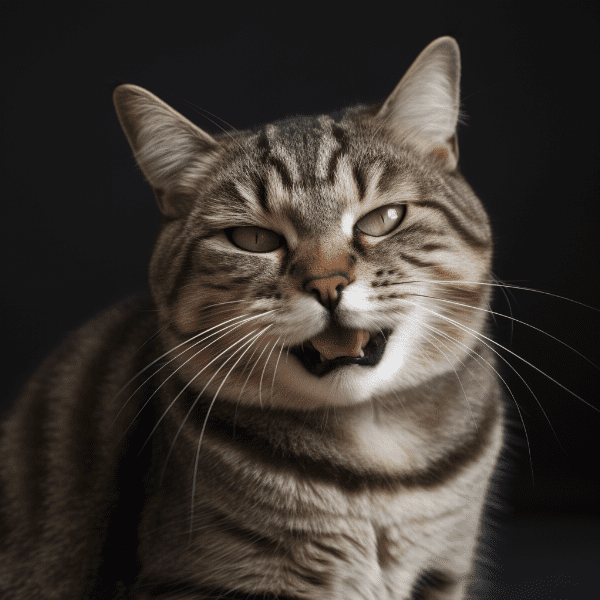
Causes of Rotten Cat Teeth
Understanding the common causes of rotten cat teeth is crucial to preventing this dental condition in your feline companion. In this section, we will discuss the most common causes of rotten cat teeth, so you can take proactive steps to ensure your cat’s dental health.
Diet
The primary cause of rotten cat teeth is diet. Cats that consume a diet high in carbohydrates or sugary foods are at a higher risk of developing dental decay. Bacteria in the mouth feed on carbohydrates and produce acid that erodes the enamel of the teeth, leading to cavities and decay.
Poor Dental Hygiene
Just like humans, cats require regular dental care to maintain healthy teeth and gums. If your cat’s teeth are not brushed regularly or if they do not receive professional dental cleanings, bacteria can accumulate in their mouth and lead to dental decay.
Age
As cats age, their teeth become more susceptible to decay and dental disease. This is due to the natural wear and tear that occurs over time, as well as the accumulation of bacteria in the mouth.
Genetics
Some cats are genetically predisposed to dental disease, and their teeth may be more susceptible to decay and other dental problems.
Trauma
In some cases, trauma to the teeth or jaw can lead to dental decay. For example, if a cat fractures a tooth, bacteria can enter the fracture and lead to decay.
Prevention of Rotten Cat Teeth
While some causes of rotten cat teeth cannot be prevented, there are several proactive steps you can take to reduce the risk of dental decay in your feline companion. In the next section, we will discuss some prevention tips and best practices for maintaining your cat’s dental health.
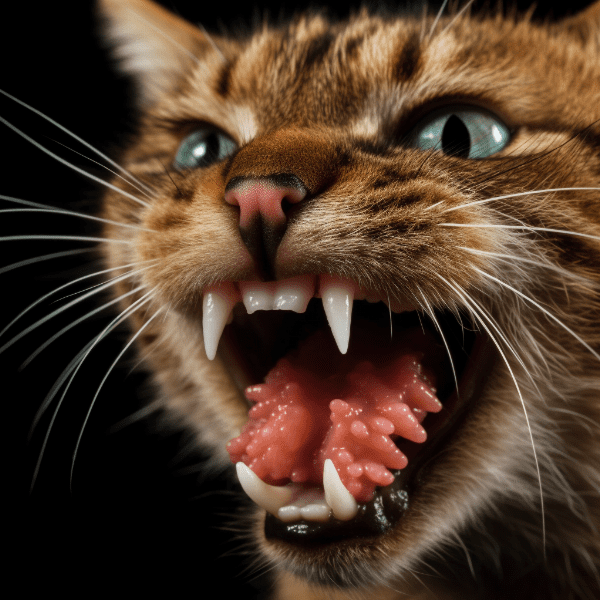
Prevention of Rotten Cat Teeth
Taking proactive steps to prevent rotten cat teeth is essential to ensuring your feline companion’s dental health. In this section, we will discuss the best practices for preventing dental decay in cats.
Dental Hygiene
Brushing your cat’s teeth regularly is one of the most effective ways to prevent dental decay. You can use a soft-bristled toothbrush and toothpaste specifically designed for cats. It is also important to schedule regular professional dental cleanings with your veterinarian to remove any tartar buildup or bacteria that brushing may have missed.
Water Additives
Adding a water additive to your cat’s drinking water can help reduce the risk of dental decay by reducing the amount of bacteria in their mouth. These additives work by disrupting the biofilm that bacteria use to adhere to the teeth and gums.
Regular Vet Check-Ups
Regular check-ups with your veterinarian are essential to maintaining your cat’s dental health. During these check-ups, your veterinarian can perform a thorough dental exam and provide advice on how to best care for your cat’s teeth and gums.
Conclusion
Preventing rotten cat teeth is essential to maintaining your feline companion’s dental health and overall wellbeing. By following the best practices outlined in this section, you can help reduce the risk of dental decay and ensure that your cat’s teeth and gums stay healthy and strong. In the next section, we will discuss the diagnosis of rotten cat teeth, so you can identify this condition in your feline friend and seek prompt treatment.
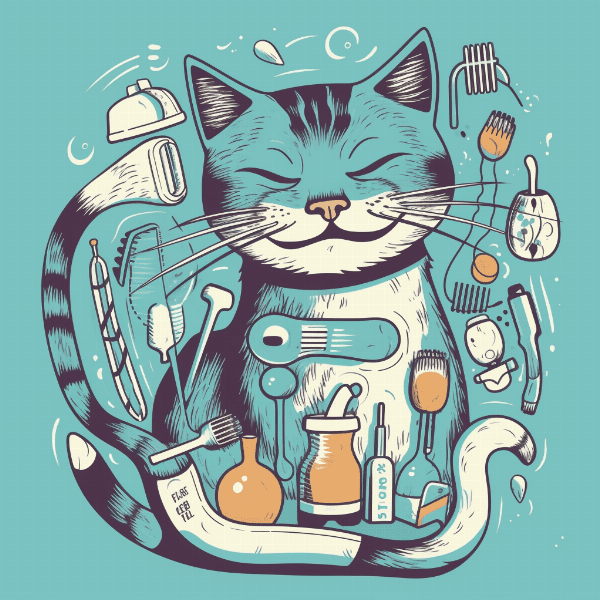
Diagnosis of Rotten Cat Teeth
Diagnosing rotten cat teeth early is essential to prevent further complications and ensure your feline companion’s dental health. In this section, we will discuss how veterinarians diagnose rotten cat teeth and the various methods they use to determine the extent of the dental decay.
Dental X-Rays
Dental X-rays are one of the most effective ways to diagnose rotten cat teeth. X-rays can reveal the extent of the decay and help your veterinarian determine the best course of treatment. X-rays can also help identify other dental problems, such as abscesses or broken teeth, that may require treatment.
Dental Probing
Dental probing is a technique that veterinarians use to measure the depth of a cavity or decay. During the procedure, the veterinarian will use a dental probe to check the teeth for any soft spots or cavities.
Anesthesia
In some cases, anesthesia may be necessary to diagnose rotten cat teeth. Anesthesia allows the veterinarian to perform a more thorough dental exam, including X-rays and dental probing, without causing discomfort to the cat.
Conclusion
Diagnosing rotten cat teeth early is crucial to preventing further complications and ensuring your cat’s dental health. By scheduling regular check-ups with your veterinarian and monitoring your cat’s behavior and symptoms, you can identify this condition early and seek prompt treatment. In the next section, we will discuss the various treatment options available for rotten cat teeth, so you can make an informed decision about your cat’s dental care.
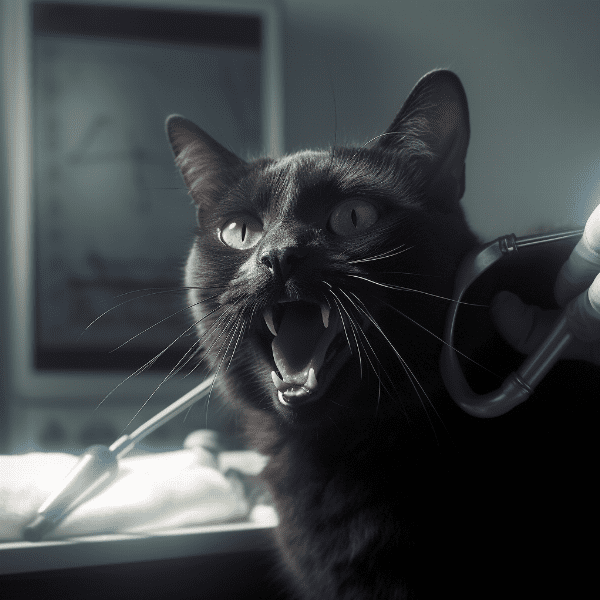
Treatment Options for Rotten Cat Teeth
There are several treatment options available for rotten cat teeth, depending on the extent of the dental decay and the overall health of your cat. In this section, we will discuss the most common treatment options for rotten cat teeth.
Dental Cleaning
If your cat has mild dental decay, a professional dental cleaning may be sufficient to remove any tartar buildup and restore the health of their teeth and gums. During a dental cleaning, your veterinarian will remove any plaque or tartar buildup using specialized tools and perform a thorough dental exam to identify any areas of decay.
Tooth Extraction
If the decay has advanced and is causing severe pain or discomfort, a tooth extraction may be necessary. During a tooth extraction, the affected tooth is removed under anesthesia. Your veterinarian will provide pain management medication to ensure your cat is comfortable during the recovery period.
Root Canal
In some cases, a root canal may be an option to save a decayed tooth. During a root canal, the infected pulp is removed, and the tooth is filled with a dental material to prevent further decay.
Antibiotics
If your cat has an abscess or infection caused by dental decay, your veterinarian may prescribe antibiotics to treat the infection and prevent it from spreading to other parts of the body.
Prevention of Further Decay
Regardless of the treatment option, preventing further decay is crucial to maintaining your cat’s dental health. Brushing your cat’s teeth regularly, providing chew toys, and feeding them a healthy diet can help reduce the risk of further decay.
Conclusion
Rotten cat teeth can cause severe pain and discomfort and can lead to other health complications if left untreated. By seeking prompt treatment and taking proactive steps to prevent further decay, you can help ensure the health and wellbeing of your feline companion. In the next section, we will discuss some home remedies for rotten cat teeth, so you can provide your cat with natural relief from dental pain and discomfort.
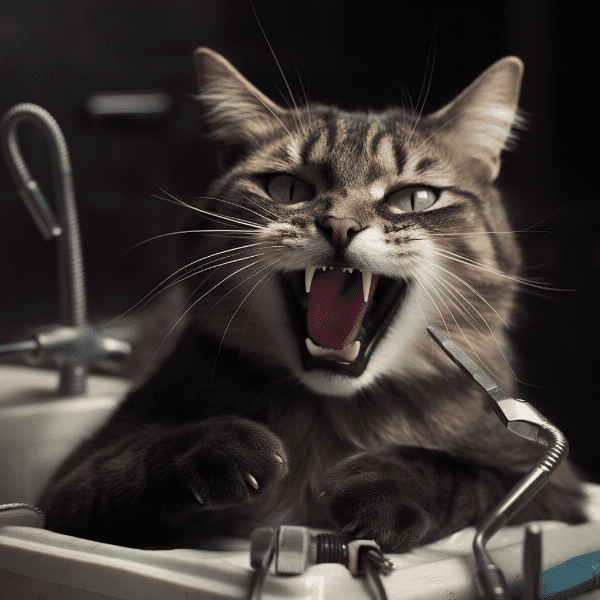
Home Remedies for Rotten Cat Teeth
While professional treatment is the best option for rotten cat teeth, there are several home remedies that can provide natural relief from dental pain and discomfort. In this section, we will discuss some of the most effective home remedies for rotten cat teeth.
Coconut Oil
Coconut oil has natural antibacterial properties that can help reduce the amount of bacteria in your cat’s mouth and prevent further decay. You can apply coconut oil to your cat’s teeth and gums using a soft-bristled toothbrush or a clean piece of cloth.
Apple Cider Vinegar
Apple cider vinegar has antimicrobial properties that can help kill the bacteria that cause dental decay. You can dilute apple cider vinegar with water and apply it to your cat’s teeth and gums using a soft-bristled toothbrush or a clean piece of cloth.
Vitamin C
Vitamin C is essential for maintaining healthy teeth and gums. You can provide your cat with a vitamin C supplement or feed them foods that are high in vitamin C, such as broccoli, spinach, and oranges.
Chamomile Tea
Chamomile tea has natural anti-inflammatory properties that can help reduce swelling and inflammation in the gums. You can brew chamomile tea and let it cool before applying it to your cat’s gums using a clean piece of cloth.
Bone Broth
Bone broth is rich in nutrients that can help promote healthy teeth and gums. You can provide your cat with bone broth as a supplement to their regular diet.
Important Considerations
While home remedies can provide natural relief from dental pain and discomfort, they are not a substitute for professional veterinary care. It is essential to seek prompt treatment for rotten cat teeth to prevent further decay and ensure the health and wellbeing of your feline companion.
Conclusion
In conclusion, there are several effective home remedies for rotten cat teeth that can provide natural relief from dental pain and discomfort. By providing your cat with a healthy diet, regular dental care, and prompt veterinary treatment, you can help maintain their dental health and ensure a happy and healthy life.
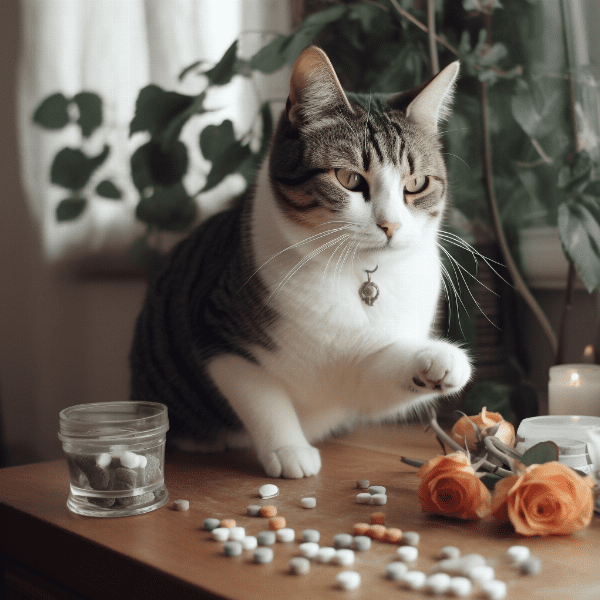
Dental Care for Cats
Maintaining your cat’s dental health is essential to their overall health and wellbeing. In this section, we will discuss the best practices for dental care for cats, so you can ensure your feline companion has a healthy and happy smile.
Brushing
Regular brushing is one of the most effective ways to maintain your cat’s dental health. You can use a soft-bristled toothbrush and toothpaste specifically designed for cats. It is essential to start slowly and make the experience positive for your cat, rewarding them with treats and praise.
Diet
Feeding your cat a healthy diet is essential to maintaining their dental health. A diet that is high in protein and low in carbohydrates can help reduce the risk of dental decay. Wet food can also be beneficial, as it helps to keep the teeth clean by washing away bacteria and food particles.
Chew Toys
Providing your cat with chew toys can help promote healthy chewing behavior and reduce the risk of dental decay. Chew toys also help to remove plaque and tartar buildup from the teeth.
Monitoring for Signs of Dental Decay
It is essential to monitor your cat for signs of dental decay, such as bad breath, yellowing of the teeth, difficulty chewing, drooling, and pawing at the mouth. If you notice any of these signs, it is essential to seek veterinary care as soon as possible.
Conclusion
Maintaining your cat’s dental health is essential to their overall health and wellbeing. By following the best practices outlined in this section, you can help ensure that your feline companion has a healthy and happy smile. Regular dental care, a healthy diet, and monitoring for signs of dental decay can help prevent rotten cat teeth and other dental problems.
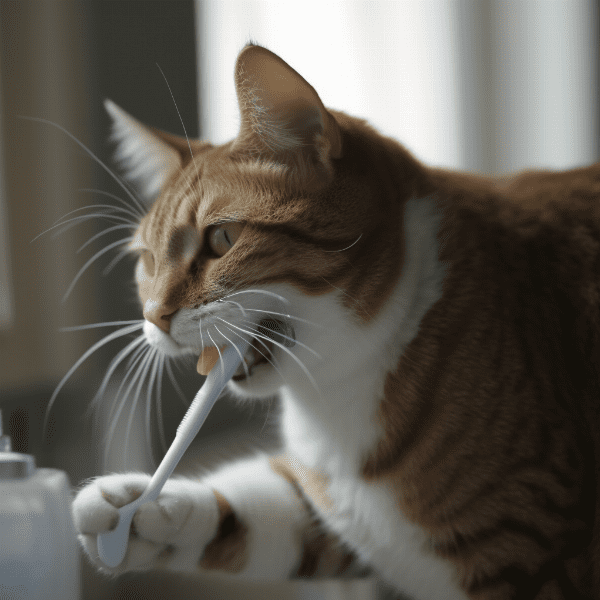
Diet and Nutrition for Healthy Teeth in Cats
Feeding your cat a healthy diet is essential to maintaining their dental health. In this section, we will discuss the best practices for diet and nutrition for healthy teeth in cats.
Protein
Feeding your cat a diet that is high in protein is essential to maintaining healthy teeth and gums. Protein helps to strengthen the jaw muscles and reduce the risk of dental decay.
Low Carbohydrates
Cats are obligate carnivores, which means that their natural diet is high in protein and low in carbohydrates. Feeding your cat a diet that is low in carbohydrates can help reduce the risk of dental decay. Carbohydrates can feed the bacteria in your cat’s mouth, leading to decay and other dental problems.
Wet Food
Feeding your cat wet food can help promote healthy teeth and gums by washing away bacteria and food particles. Wet food also helps to keep your cat hydrated, which is essential for maintaining their overall health.
Water
Providing your cat with clean, fresh water is essential to their dental health. Water helps to wash away bacteria and food particles, reducing the risk of dental decay. It is important to change your cat’s water regularly and ensure that they have access to water throughout the day.
Supplements
Providing your cat with supplements can help promote healthy teeth and gums. Vitamin C and calcium are essential for maintaining healthy teeth and bones. You can provide your cat with supplements or feed them foods that are high in these nutrients.
Conclusion
Feeding your cat a healthy diet is essential to maintaining their dental health. By following the best practices outlined in this section, you can help ensure that your feline companion has a healthy and happy smile. A diet that is high in protein, low in carbohydrates, and includes wet food and clean water can help reduce the risk of dental decay and other dental problems. Providing supplements can also help promote healthy teeth and gums.
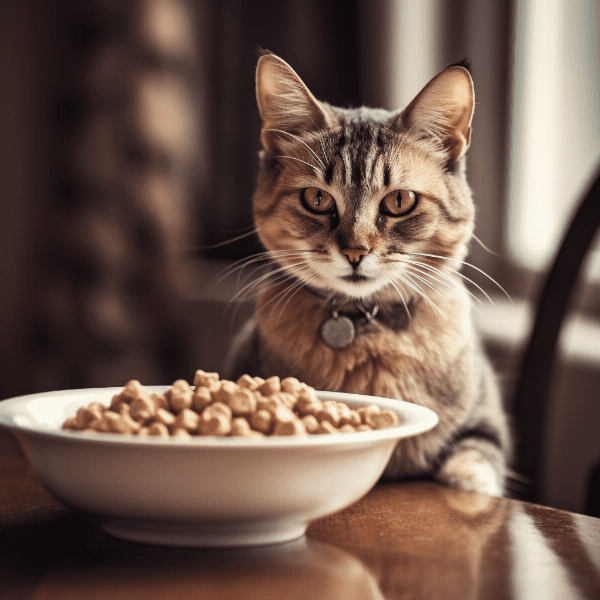
Regular Vet Check-Ups for Dental Health
Regular check-ups with your veterinarian are essential to maintaining your cat’s dental health. In this section, we will discuss the importance of regular vet check-ups for dental health and what to expect during these check-ups.
Importance of Regular Vet Check-Ups
Regular check-ups with your veterinarian are essential to maintaining your cat’s dental health. During these check-ups, your veterinarian can perform a thorough dental exam and identify any signs of dental decay or other dental problems. Early detection and treatment of dental problems can help prevent further decay and ensure the health and wellbeing of your feline companion.
What to Expect During a Check-Up
During a dental check-up, your veterinarian will perform a thorough physical exam, including an examination of your cat’s teeth and gums. They will look for signs of dental decay, such as cavities, tartar buildup, and inflamed gums. They may also perform dental X-rays and dental probing to identify any areas of decay that may not be visible during a physical exam.
Professional Dental Cleanings
Regular professional dental cleanings with your veterinarian are essential to maintaining your cat’s dental health. During these cleanings, your veterinarian will remove any plaque or tartar buildup and perform a thorough dental exam to identify any areas of decay. Professional dental cleanings are typically performed under anesthesia to ensure the safety and comfort of your cat.
Dental Care Recommendations
Based on the results of the dental exam, your veterinarian may provide recommendations for dental care, such as brushing your cat’s teeth, providing chew toys, and feeding them a healthy diet. They may also recommend further treatment, such as a tooth extraction or root canal, if necessary.
Conclusion
Regular check-ups with your veterinarian are essential to maintaining your cat’s dental health. By scheduling regular dental check-ups and following your veterinarian’s recommendations for dental care, you can help ensure the health and wellbeing of your feline companion. Early detection and treatment of dental problems can help prevent further decay and ensure that your cat’s teeth and gums stay healthy and strong.
